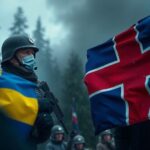Sweden and Finland Issue War Preparedness Guidance to Citizens
Sweden and Finland have issued updated pamphlets advising citizens on how to prepare for potential crises or warfare. Amid rising geopolitical tensions, the pamphlets cover various aspects of survival, including maintaining emergency supplies and cash reserves. This initiative reflects both countries’ recent NATO membership and demonstrates a shift towards enhancing public readiness in light of contemporary threats, especially from Russia.
In a significant move aimed at bolstering public readiness amidst growing geopolitical tensions, Sweden and Finland have disseminated updated survival guidance to millions of households. The Swedish Civil Contingencies Agency is mailing revised pamphlets outlining essential steps citizens should take in the event of war or crisis, reflecting an increased awareness of potential threats following the Russian invasion of Ukraine. The brochure emphasizes preparedness in areas such as shelter, food storage, cash reserves, and psychological well-being. The pamphlet, which doubles in length from the previous edition issued six years ago, contains critical information on how to manage various emergencies, including natural disasters, disease outbreaks, and cyber threats. Notably, both nations, having recently joined NATO, are adapting to a shifting threat landscape, particularly due to heightened tensions with Russia. Finland has simultaneously published online advice addressing everyday disruptions any potential conflict might instigate, thus emphasizing the need for citizen preparedness. The guidance also includes practical measures to maintain comfort during prolonged crises, such as methods to conserve heat and recommendations to engage in leisure activities to alleviate stress. Finnish officials have reiterated the importance of cash reserves during emergencies and have encouraged citizens to think critically about their ability to survive without access to banking services. This renewed focus on preparedness is reflected historically, particularly in Finland, where memories of wartime struggle against the Soviet Union remain fresh, influencing contemporary defense policies. Conversely, Sweden, which historically adopted a stance of neutrality, has shifted its military approach to encompass both conscription and professional service, heightening compositional readiness among its populace. In response to global tensions, this emphasis on citizen preparedness is not isolated, as other Nordic nations, including Norway and Denmark, have also echoed similar sentiments by publishing advice regarding wartime readiness.
The heightened tensions surrounding the war in Ukraine and concerns regarding Russian military actions have prompted Sweden and Finland to emphasize public preparedness. Sweden’s release of an updated pamphlet reflects a strategic approach to educate citizens on handling potential crises ranging from military attacks to natural disasters, implying a significant shift in public policy since the Cold War. This adaptation follows both countries’ recent accession to NATO, highlighting their changing security landscape and commitment to collective defense strategies. The historical context of Nordic relationships with Russia, including Finland’s unique wartime experience, provides resonance for these initiatives, as both nations seek to ensure their populations are equipped to respond to threats effectively.
In summary, Sweden and Finland’s recent efforts to enhance public preparedness for potential crises reflect a broader understanding of contemporary geopolitical risks. As both nations grapple with the reality of increased threats from Russia, their respective pamphlets provide vital information on practical survival strategies. This proactive measure not only showcases a commitment to national security but also informs citizens on vital steps needed for resilience in uncertain times. The consistent increase in public guidance indicates a collective move towards readiness in the face of potential conflict.
Original Source: metro.co.uk








Post Comment